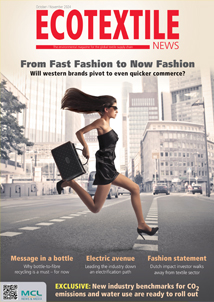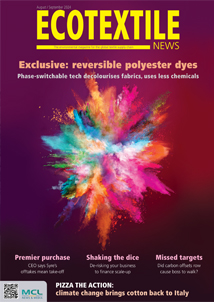WAKEFIELD – In our latest Ecotextile Talks podcast, hosted by Phil Berman, we hear from Oeko-Tex product manager Melanie Teuteberg regarding the company’s recently launched Responsible Business tool.
The Swiss firm launched the solution in late October, indicating that it could support brands, retailers and traders in the textile and leather sectors with due diligence compliance amidst an influx of new legislation on the issue.
“What we provide is a guided approach, everything is already broken down into steps that help the company understand where we are with the implementation of due diligence and where we need to work further,” says Teuteberg.
The uninterrupted podcast is available to listen to HERE.
“I think companies, until today, have never really considered what’s going to happen in their supply chains. It’s not transparent, you have a business relationship and a contractual relationship with your direct suppliers, but what’s beyond the direct suppliers is often not known for the ‘order placing companies’ – the brands, retailers,” explains Teuteberg.
That is where Oeko-Tex is hoping to step in and streamline the transition process for stakeholders across the textile and leather goods sectors.
The certification tool – which companies can use for self-assessments or to allow third-party verification – will assess six areas: business policy, risk assessment, integration of appropriate actions, continuous monitoring, transparent communication, and complaint mechanism.
A seventh voluntary module focuses on climate action. For this, companies commit to the Paris Agreement and its target to limit global warming to 1.5 degrees Celsius above pre-industrial temperatures.
“With Responsible Business we actually extend our services further and look into the management processes and as we see these expanding requirements on due diligence, we also want to support our customers with a tool to facilitate the implementation of due diligence but also the reporting.”
The standard is based on the UN Guiding Principles on Business and Human Rights (UNGPs), the OECD Guideline for Multinational Enterprises, the OECD Due Diligence Guidance Textile and Footwear and the OECD Guideline for Responsible Business Conduct.
It also ensures compliance with the German Supply Chain Act and the proposed European Directive on Corporate Sustainability Due Diligence.
“Businesses will be forced to implement their due diligence obligations so they’ll have to prove and document that they have responsible business practices in place and business enterprises will need to consider all of the effects of the products they are purchasing and the ones they’re producing in the supply chains,” Teuteberg notes.
“This is a complete new concept to business enterprises.”
Subscribe to our podcasts and radio shows by following us on Apple, Google, Spotify and Amazon Music, to automatically get alerts when we launch a new Ecotextile Talks Behind the News podcast.







































